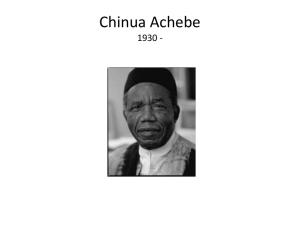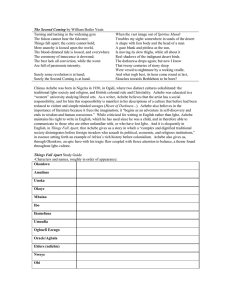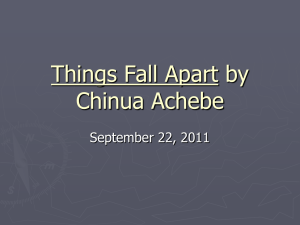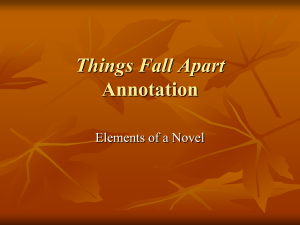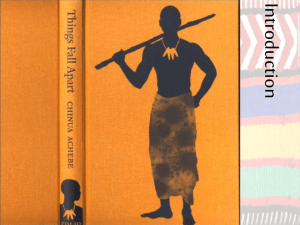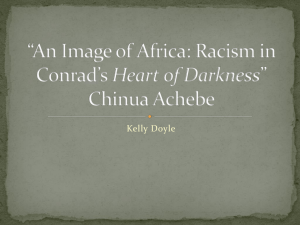This essay argues that the placing of Things Fall Apart in conversation with Heart of Darkness
advertisement
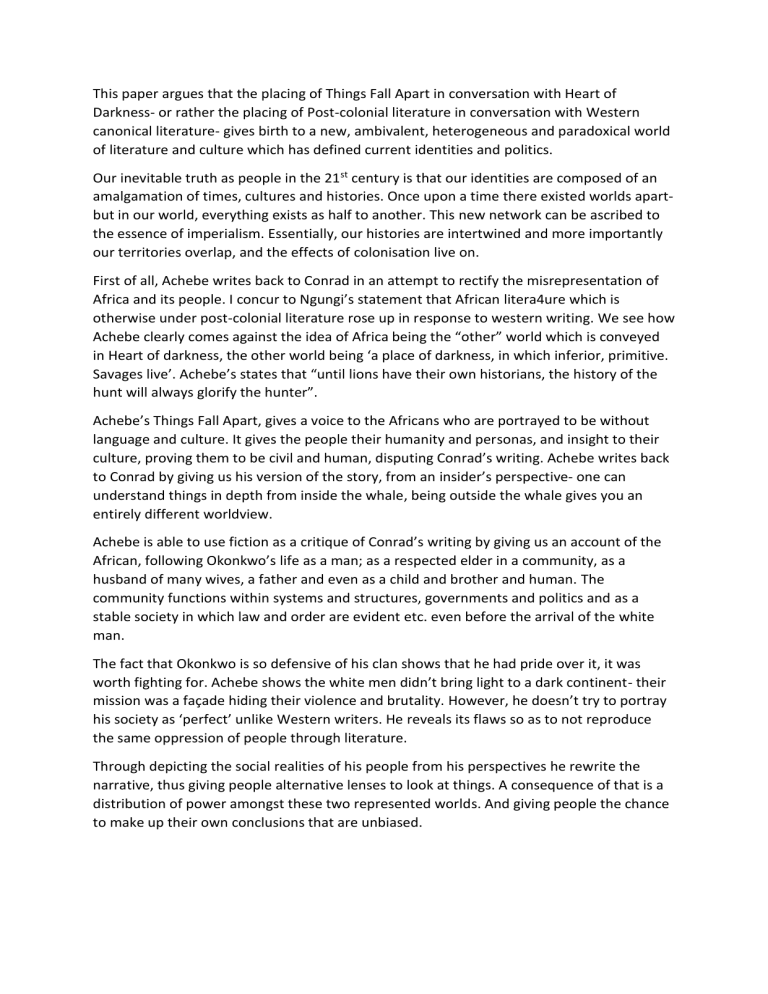
This paper argues that the placing of Things Fall Apart in conversation with Heart of Darkness- or rather the placing of Post-colonial literature in conversation with Western canonical literature- gives birth to a new, ambivalent, heterogeneous and paradoxical world of literature and culture which has defined current identities and politics. Our inevitable truth as people in the 21st century is that our identities are composed of an amalgamation of times, cultures and histories. Once upon a time there existed worlds apartbut in our world, everything exists as half to another. This new network can be ascribed to the essence of imperialism. Essentially, our histories are intertwined and more importantly our territories overlap, and the effects of colonisation live on. First of all, Achebe writes back to Conrad in an attempt to rectify the misrepresentation of Africa and its people. I concur to Ngungi’s statement that African litera4ure which is otherwise under post-colonial literature rose up in response to western writing. We see how Achebe clearly comes against the idea of Africa being the “other” world which is conveyed in Heart of darkness, the other world being ‘a place of darkness, in which inferior, primitive. Savages live’. Achebe’s states that “until lions have their own historians, the history of the hunt will always glorify the hunter”. Achebe’s Things Fall Apart, gives a voice to the Africans who are portrayed to be without language and culture. It gives the people their humanity and personas, and insight to their culture, proving them to be civil and human, disputing Conrad’s writing. Achebe writes back to Conrad by giving us his version of the story, from an insider’s perspective- one can understand things in depth from inside the whale, being outside the whale gives you an entirely different worldview. Achebe is able to use fiction as a critique of Conrad’s writing by giving us an account of the African, following Okonkwo’s life as a man; as a respected elder in a community, as a husband of many wives, a father and even as a child and brother and human. The community functions within systems and structures, governments and politics and as a stable society in which law and order are evident etc. even before the arrival of the white man. The fact that Okonkwo is so defensive of his clan shows that he had pride over it, it was worth fighting for. Achebe shows the white men didn’t bring light to a dark continent- their mission was a façade hiding their violence and brutality. However, he doesn’t try to portray his society as ‘perfect’ unlike Western writers. He reveals its flaws so as to not reproduce the same oppression of people through literature. Through depicting the social realities of his people from his perspectives he rewrite the narrative, thus giving people alternative lenses to look at things. A consequence of that is a distribution of power amongst these two represented worlds. And giving people the chance to make up their own conclusions that are unbiased. This immediately brings up issues of representation and power. The west has always ceased the power of constructing social realities for its own imperial agendas and they have since disadvantaged the rest by misrepresenting them, thinking that they would not be able to retaliate. Postcolonial writers, Achebe in particular are proof that the powerless could also present their version of the truth. Literature has in many ways been used as a means to write back, to claim back a power that was taken away. In the case of Heart of Darkness and Things Fall apart we see how as Said said “the west views the orient as an outsider”, Africa is portrayed as a world of negationssavage, dark, primitive and evil. In representing a people, a culture and a society in this manner, they are able to uphold themselves as better, as absolute opposites of the other and consequently to “save” them poor barbarians in Africa through conquest. Heart of darkness shows the “superiority” of whites over blacks by portraying the


